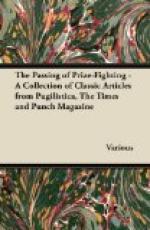It was on the tip of my tongue to repeat my witticism, which was still true, but I refrained.
I paid the first dozen five-pound instalments without comment. Up till then I had been fully occupied in studying how FOCH was getting on with the other sort of pig over there. But now I began to think.
I was thinking heavily when I put on my hat, but when I reached the premises of the Patriot Pigs I was thinking things that I prefer not to talk about. To begin with, they were housing the poor little beasts in a place you wouldn’t dream of inflicting on the poorest labourer. And the overcrowding! And the dirt! And the pigs themselves! They were positively uncanny. There was something almost human about them. They were all heads and no bodies. It was just as though the other half of the wits of the half-witted boy who looked after them had distributed itself among the whole herd. I could have wept when I thought how my purse and my swill-tub had been emptied to keep such puny monstrosities in the land of the living.
I had my pig taken out and weighed. He turned the scale at forty-eight pounds.
A week later I went and weighed him again; he had shrunk to forty.
I am a man of action. In a flash my mind was made up. I put him on a string and led him home.
My wife seemed rather surprised when we entered the drawing-room, but I hastened to explain.
“I paid five pounds,” I said, “for a five-pound pig. Since then I ’ve paid fifty-five pounds more, and I have been led to expect, that at the very least the pig was keeping pace. But it isn’t. The sterling is increasing by leaps and bounds; the avoirdupois is not even stationary. That’s not counting several tons of swill that ought to be inside him but aren’t. It can’t go on.” I paused and added darkly, “That pig shall not return.”
“But surely you’re not going to have him live with us, Henry?”
I controlled myself.
“No, Maria,” I said, “I am not. At a late hour to-night we will take him out into the country and lose him.”
“Oh, Henry,” she began, “supposing—”
I interrupted gently but firmly.
“My mind,” said I, “like BERT COOTE’S, is made up. He is my pig and I may do what I like with him. There is no law against one losing one’s pig. Besides, he is ruining me.”
At 10 P.M. we set out en famille. It was July. I remember the date rather particularly because it was just then that they ceased to ration bacon altogether. At 10.30 the pig was safely lost. At 11 the front-door closed upon us. At 11.1 little Willy Perkins, the butcher’s son, arrived with the pig and claimed something for restoring lost property.
A man with a position to keep up simply can’t afford to be caught in the act of feloniously making away with pigs in war-time; besides DORA was still alive and she might have something to say; so I had to pretend how pleased I was, and I gave the scamp half-a-crown.




